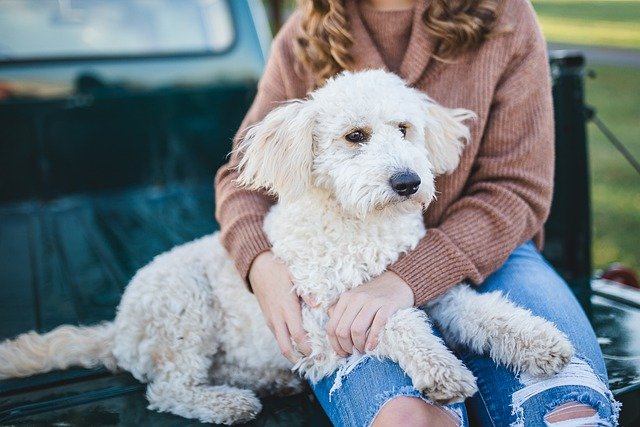
10 Tips to Being a Responsible Dog Owner
Share
By Cassandra Loskocinski
Hello, dog owners. At times it may seem as if being a responsible dog owner can be a difficult task, so we consulted with veterinarian Dr. Lynn Courter with the Veterinary Wellness Center in North Canton and vet technician Joseph Feldman, with Puppy Connections to provide you with 10 tips to keep your four-legged, furry friend happy, healthy and barking for joy
1. Select a dog breed that best suits your home and lifestyle
It's important to remember when choosing a dog, there are many factors you need to take into consideration. Do you live in a house, or an apartment? Do you have a large or a small backyard? How many family members do you have living in your home? All of these are just some of the factors you need to consider before you bring a new dog into your home. The size and breed of your dog determines its behaviors, how energetic they are, and how much space they need to roam, so consider these factors when determining which breed best suits your lifestyle.
2. Maintain healthy weight
Consult with your pet’s veterinarian to get a baseline weight and get recommendations on how much and how often your dog should be fed. “We use a 9 point scale system so once you know where your pets weight falls within that range, you can gage where the best place is to start,” said Dr. Courter. The nine point scale allows veterinarians to assess whether your dog's weight is where it should be; for example, a nine point would indicate your dog is overweight, while a 4.5 would be the ideal weight for your dog.
Dr. Courter adds, “Most dog owners say they feed their dogs about a cup of food twice a day, but using a measuring cup works best to get a good visual on how much you should actually be feeding your dog.” Many dog owners believe that they are feeding their dog the right portions of food, but when they start using a measuring cup find that they have been overfeeding the whole time. This is why it’s important to use a measuring cup to ensure the most accurate servings for your dog.
Following the dog food manufacturer’s feeding guidelines on the back of the bag and using a measuring cup are all good ways to carefully proportion and keep a healthy weight for your dog. Likewise, ask your dog’s veterinarian what food would be most appropriate for the life stage of your dog.
3. Brush your pet's teeth every 1-2 days
Dr. Courter recommends brushing your dog's teeth regularly. “Brushing is preventative care that's best started in puppyhood, because some dogs' temperaments make brushing teeth difficult so it's best to start early so your dog can get used to tooth brushing. Brushing your dog's teeth is a good preventative measure for tartar build up and periodontal disease (A gum disease). If your dog's teeth already has a large buildup of plaque and tartar, it is recommended to have a professional clean your dog’s teeth.” Good dental care is very important to your dog's health.
4. Get pet insurance
There are a lot of different options when it comes to pet insurance, and it's all about finding the right insurance plan for you and your dog. You can choose a plan from places like Nationwide, Geico, and several others. If you do your research and ask your veterinarian, you can find a plan based on your pet’s needs that include yearly checkups and emergencies, which can make a difference for your budget and for the health of your pet.
Joseph Feldman says, “I think it is really great that pet insurance is getting more and more popular. Many insurance companies are adding pet owners to your health insurance.” Some clinics offer their own wellness plans that can cover emergencies. Feldman is most familiar with Banfield and Embrace pet insurance. Most Banfield Clinics are inside PetSmart stores. Embrace insurance is usually accepted at most veterinarian clinics. “Both offer a wellness or preventative option to encourage regular visits,” says Feldman.
5. Learn common toxins to your dog
Be aware of the common toxins found in “people” food and plants that could be toxic to your pet. “Chocolate is definitely up there, but toxic foods that a lot of people maybe aren't aware of for dogs are grapes and raisins. Because people don’t know about its toxicity to dogs, it's very commonly seen by veterinarians,” says Dr. Courter. There are several foods that can be potentially toxic to dogs, so it's definitely important to monitor and watch what your dog is consuming, as well as look up and find out what foods they can and cannot have.
6. Contact a vet before administering any medicines to your pet
Human medicines are not meant for dogs, and while it may be tempting to try to help your furry friend by giving them some Advil or something that might help a human’s upset stomach, be sure to check with a veterinarian first. The last thing you want to do is give your pet a drug that can be toxic, so contact a professional before administering medication that isn't meant for your pet.
7. Keep your pet updated on vaccinations and get regular check ups
Be sure to consult with your pet’s veterinarian to determine which vaccinations are appropriate for your pet. Veterinarians are excellent resources, and they are invested in maintaining your pet’s optimal health so it’s important to schedule yearly checkups.
8. Exercise your dog
It's very important to exercise your dog regularly. According to Feldman, exercise requirements vary with dog breed. A younger dog will need more exercise than a senior dog. An active breed, such as a Border Collie or Australian Shepard will need more activity than a Shih Tzu or a Maltese. That being said, an hour or two a day will help keep your dog healthy both physically and mentally. It does not have to be all at once.
It can be difficult to exercise a dog in the winter. Again, the type of dog you have may limit some of your alternatives. Smaller dogs should have no problem running around in your house to get their exercise, but if you live in an apartment with a bigger dog it might be difficult for them to get all the exercise they need. It's important that they be taken on walks regularly to promote healthy weight and exercise.
9. Do your research
One of the most important elements of being a responsible pet owner is doing your research. Determine the best type of food, the right vet to take them to, how to maintain a healthy diet and exercise, and a whole lot more. The best things you can do for your pet is to determine how to best take care of your pet holistically. By partnering with the right veterinarian and doing your research, you can be best assured your pet will live a healthy and happy life.
“One of the best things you can do to become a responsible pet owner is earn as much as you can before you get your pet. Which breed fits your lifestyle? What are the exercise requirements for your breed? What kind of food? How will you train? Should I go to a class? Knowing the answers to these questions before you get a pet will make the whole process much smoother and less stressful,” says Feldman.
10. Take the time to train your dog
Make sure your dog is well trained. There are many ways that you can train your dog, they can be taken to classes, trained at home, using treats as motivators to learn commands, or even with a professional. It is important to do one’s research for the breed of dog that you have and take into account their temperament, which can help determine how much training they are going to need. While finding a good trainer can be difficult you can always consult a veterinarian, ask other dog owners in your neighborhood, and of course do your own online research to find dog trainers in your area.
“If you are in an apartment, your neighbors may not appreciate your dog getting rambunctious indoors,” says Feldman. This is one of the reasons why it’s important for you to have the proper training for your dog. You don't want your dog to pose a threat to other dogs or people, this can cause you to run into serious problems with neighbors and authorities and can result in something horrible like your dog being taken away from you, or much worse. So taking responsibility and doing research on how to best train your dog will keep your dog, yourself, and others safe and happy!
About Cassandra Loskocinski
Cassandra Loskocinski is an undergraduate senior studying Creative Writing at Malone University. Originally from a small town in Connecticut, she has migrated to Ohio. She is excited for the opportunity to study abroad in Scotland in the Fall 2021.She hopes to one day get a dog of her own, write her own poetry books and eventually retire to a horse farm that she can convert into a bed and breakfast.
About WoofPack Trails
WoofPack Trails was created with active dog lovers in mind. There, you can purchase the WoofPack dog walking accessory bag - the "go-to" carryall for dog lovers on-the-go. The WoofPack features a unique antimicrobial compartment to store bagged dog waste plus separate pockets for all your other items. The WoofPack is perfect for active dog lovers and professional dog walkers. Travel with the Pack and get a hands-free, more enjoyable on-the-go experience with your pets.
